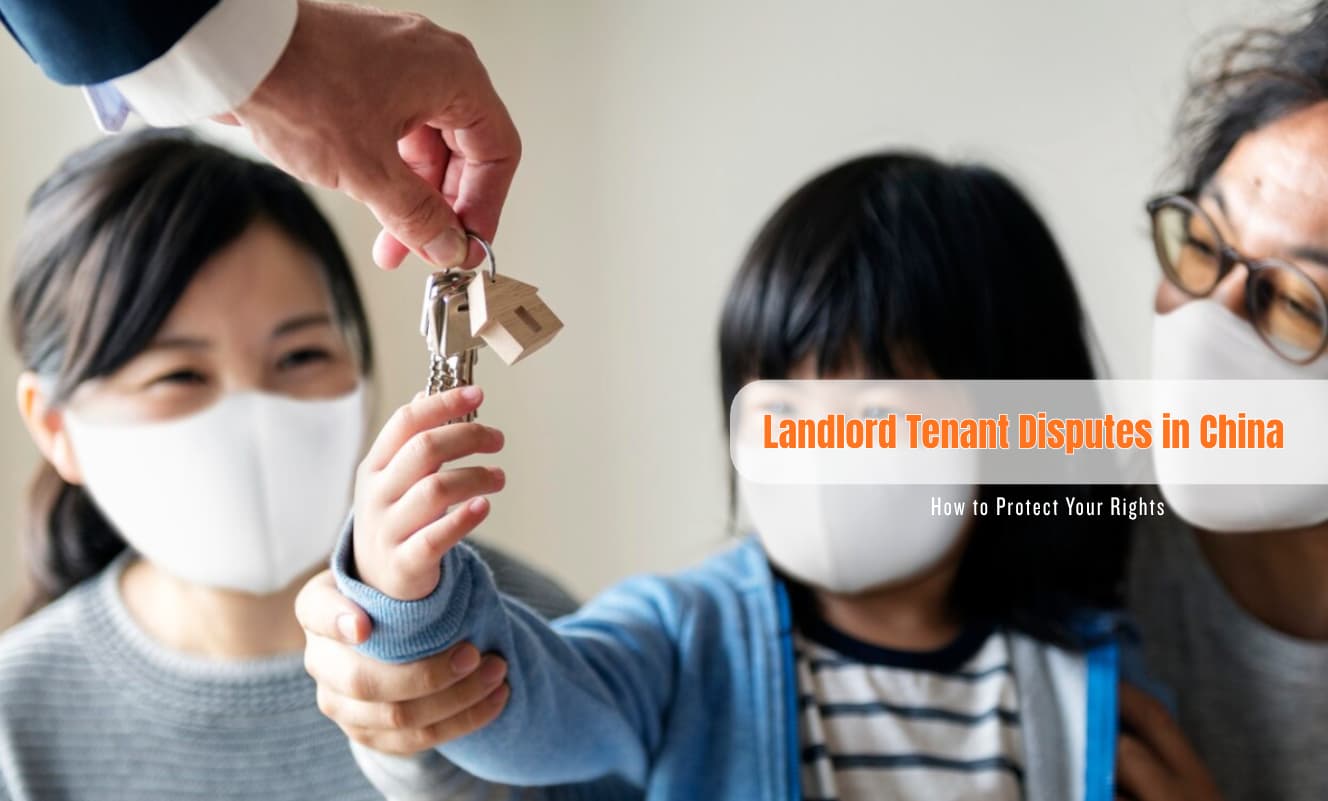Renting in China can be exciting, but it’s not always a smooth process. Many tenants and landlords find themselves in disputes about deposits, repairs, or early termination.
When money and housing security are on the line, knowing your rights is the only way to protect yourself.
This guide breaks down landlord-tenant disputes in China, explaining how the law works, what steps to take, and when to seek expert help.
Whether you are a foreigner renting in Shanghai or a local landlord in Shenzhen, the principles are the same: act quickly, keep records, and follow the right process.
Quick Guide - What You Need to Know (And Do)
- The PRC Civil Code governs rental contracts and establishes rules governing the rights of landlords and tenants.
- Common disputes involve deposits, repairs, early termination, and rent increases.
- Begin with negotiation or mediation, but escalate to arbitration or court litigation if necessary.
- Keep evidence like lease agreements, receipts, and photos. It often decides the case.
- Local governments in China are tightening rental rules to make housing more transparent and fair.
- For complex cases, get professional legal help early to avoid mistakes.
Typical Reasons for Landlord-Tenant Disputes in China

Renting an apartment in China can be straightforward, but disputes between landlords and tenants are common.
Understanding the most frequent problems helps you recognize warning signs early and protect your rights.
Below are the major dispute areas in Chinese rentals, along with practical steps to avoid or resolve them.
Common Dispute Areas:
1. Rent Payments
Rent payment issues are among the top causes of conflict in China's rental market. Late or missed payments create tension and can damage the landlord-tenant relationship. Disputes also arise when landlords add unexpected charges or change payment schedules without notice.
What helps:
- Set automated reminders on your phone or banking app to pay rent on time each month
- Use secure bank transfers instead of cash to create a clear payment trail
- Keep digital or printed receipts for every rent payment you make
- Confirm payment dates and amounts in your lease contract to avoid confusion
2. Security Deposits
Deposit disputes are extremely common in Chinese rentals. Many landlords withhold part or all of the deposit, claiming damages that tenants did not cause.
In some cases, tenants lose their deposits even when the property is returned in excellent condition.
What helps:
- Take clear photos or videos of every room, appliance, and fixture during move-in and move-out
- Request a written, itemized receipt for your deposit payment
- Clean the apartment thoroughly before leaving and fix minor wear if possible
- Conduct a final walkthrough with the landlord and document their approval
- Keep copies of all deposit-related communication and receipts
3. Lease Contracts
Unclear or poorly written rental contracts lead to frequent misunderstandings. Some agreements include vague terms, hidden penalties, or confusing rules about repairs, lease duration, or early termination.
Unclear contract language makes it difficult to know who is responsible for what.
What helps:
- Request both English and Chinese versions of the lease agreement
- Read every section carefully and highlight any unclear or confusing terms
- Ask the landlord or agent to explain any clauses you do not fully understand
- Consider hiring a translator or legal consultant to review the contract before signing
- Ensure that all verbal promises are written into the contract
👉 Also Read: English-Speaking Lawyer in China
4. Property Repairs and Maintenance
Repairs are a major source of tension between landlords and tenants. Disagreements often involve broken appliances, faulty plumbing, damaged doors, or heating and cooling systems.
Tenants may believe that repairs are the landlord's responsibility, while some landlords expect tenants to cover repair costs themselves.
What helps:
- Inspect the property with the landlord before moving in, and create a checklist of existing damages
- Take photos of any pre-existing issues and have the landlord sign off on the list
- Save all receipts, invoices, and communication related to repair requests
- Report maintenance problems immediately in writing through text, email, or messaging apps
- Clarify in your contract which repairs are the landlord's responsibility and which are yours
5. Evictions and Rent Increases
Sudden eviction notices or unexpected rent increases cause significant stress for renters. Some landlords ask tenants to move out before the lease ends or demand higher rent without proper notice.
These actions may violate local housing laws, but many tenants are unaware of their legal protections.
What helps:
- Learn your city's specific eviction and rent control regulations before signing a lease
- Know the legal notice period required for evictions in cities like Beijing, Shanghai, or Shenzhen
- Understand whether your city has rent increase caps or limits on mid-lease changes
- Keep a copy of your signed lease and refer to it if the landlord makes sudden demands
- Contact local housing authorities or tenant advocacy groups if you believe the eviction or rent increase is unlawful
Most landlord-tenant disputes in China stem from poor communication, unclear documentation, or a lack of knowledge about tenant rights.
Staying organized, keeping written records, and understanding local housing laws can help you prevent problems before they escalate.
Always clarify expectations with your landlord and document everything in writing to protect yourself financially and legally.
👉 Also Read: China Landlord Obligations: What Renters Need To Know
How to Handle a Landlord-Tenant Dispute in China

Here’s how to keep control and find a solution.
Communicate First
Most disputes actually start with confusion, not anger. Before you overreact, send polite messages to resolve the issue.
- Keep emotions in check and focus on fixing the issue.
- Save all texts, emails, and summaries of phone calls.
- Face-to-face talks can help, just be sure to follow up with a written summary.
Use Mediation and Community Support
If one-on-one talks fail, your city likely has a mediation center or local government program. These are helpful before going to court.
- A mediator listens to both sides and helps reach a fair agreement.
- Mediation is often free or affordable.
- Written agreements resulting from mediation are considered strong evidence.
Go to Court If Needed
If nothing seems to work and bigger issues arise, such as illegal eviction or refusal of major repairs, the Chinese legal system is your backup plan.
- Courts require hard evidence, such as signed contracts, payment records, photographs, and repair receipts.
- File papers online or in person, and list all supporting documents.
- Lawyers can help you prepare and effectively represent your case.
When to Hire a Legal Expert
For complicated or high-stakes cases, get experienced help. Choi & Partners specializes in Chinese rental disputes and guides you through every step.
- Professional lawyers review your situation, outline solutions, and represent you.
- They can present your evidence, negotiate settlements, and lead mediation or court cases.
Rental Laws and City Rules
Laws and rules change from city to city. Protect yourself by researching before you sign or argue.
Save Written Evidence
- Always insist on written agreements and receipts.
- Store payment screenshots, contracts, and clear photos of apartment condition.
City Regulations
- Beijing, Shanghai, and other big cities have special rent, deposit, and eviction policies.
- Some cities let you resolve issues online through official portals.
Respect Timelines
- Contracts should clearly state rent deadlines, deposit refund dates, and notice periods.
- Act on issues promptly, as courts expect you to adhere to legal timeframes.
How to Prevent Rental Disputes
Preventing rental disputes in China is easier than resolving them. By taking proactive steps before and during your lease, you can avoid most conflicts with your landlord. Below are proven strategies to protect yourself and maintain a positive rental experience.
Read Every Part of Your Lease
Your rental contract is the foundation of your legal rights and responsibilities. Many disputes happen because tenants do not fully understand what they signed. Reading the entire lease carefully helps you avoid surprise fees, unclear rules, and unfair penalties.
What to do:
- Request both English and Chinese versions of the lease if you are not fluent in Chinese
- Review every clause, including sections on repairs, guest policies, subletting rules, and early termination
- Ask your landlord or agent to explain any confusing or vague terms before you sign
- Check for hidden fees such as property management charges, cleaning costs, or utility deposits
- Make sure all verbal agreements are included in the written contract
- Keep a signed copy of the lease in a safe place for future reference
Document the Property Condition
Thorough documentation protects you from false damage claims and deposit disputes. Taking the time to record the property's condition at move-in and move-out creates clear evidence that can prevent disagreements.
What to do:
- Conduct a detailed walkthrough with your landlord on the day you move in
- Take clear photos or videos of every room, including walls, floors, ceilings, windows, and doors
- Document the condition of appliances, furniture, plumbing fixtures, and electrical outlets
- Create a written handover list that describes existing damages, stains, or wear and note the date
- Ask the landlord to sign the list and keep a copy for your records
- Repeat the same documentation process when you move out to prove the property's condition
Pay with Traceable Methods
Using secure and traceable payment methods protects you in the event of disputes over rent, deposits, or other charges.
Cash payments make it difficult to prove what you paid and when, leaving you vulnerable in disagreements.
What to do:
- Always pay rent and deposits through bank transfer, Alipay, or WeChat Pay
- Avoid paying cash unless absolutely necessary, and request a signed receipt if you do
- Save digital records of every payment, including transaction confirmations and receipts
- Ask your landlord to provide a written receipt or fapiao (official invoice) for each payment
- Keep payment records organized in a folder or app so you can access them quickly if needed
Stay Transparent and Communicate Clearly
Open and honest communication with your landlord builds trust and prevents misunderstandings. Keeping your landlord informed about changes or issues shows respect and makes it easier to resolve problems quickly.
What to do:
- Notify your landlord immediately if something breaks or needs repair
- Send messages through text, WeChat, or email so you have written proof of your communication
- Inform your landlord in advance if you plan to travel for an extended period
- Ask for permission before making any changes to the property, such as installing shelves or bringing in pets
- Be honest about guests, roommates, or any other changes to your living situation
- Respond promptly to your landlord's messages and questions to maintain a positive relationship
Find Community Resources
Many neighborhoods in China offer free or low-cost services to help resolve rental disputes. Taking advantage of these resources can save you time, money, and stress.
What to do:
- Locate your local neighborhood committee office, which often provides mediation services for tenants and landlords
- Visit community mediation centers that specialize in housing disputes and offer neutral guidance
- Ask expat groups, online forums, or local housing authorities for recommendations on legal aid or tenant support services.
- Keep contact information for these resources handy in case you need help quickly.
- Utilize mediation services promptly to prevent minor issues from escalating into major conflicts.
Preventing rental disputes in China requires preparation, clear communication, and careful documentation.
By reading your lease thoroughly, recording the property's condition, paying with traceable methods, staying transparent with your landlord, and knowing where to find help, you can avoid most common rental problems.
Taking these steps protects your rights, saves your deposit, and ensures a smoother rental experience.
Final Thoughts
Landlord-tenant disputes in China can be stressful, but the law gives you options. By knowing your rights, maintaining accurate records, and selecting the appropriate forum, you can resolve most issues fairly.
Key points to remember:
- Review your lease and Civil Code.
- Document everything.
- Try negotiation first, then escalate to mediation, arbitration, or court if needed.
- Foreign tenants should insist on bilingual contracts and clear dispute clauses.
REMEMBER📌: The best defense is prevention. Get a solid contract and keep a clean paper trail from day one.
👉 Need expert help? Don’t wait until the dispute spirals. Contact the best lawyer in China, Choi & Partners, for trusted legal advice.
FAQs: Landlord Tenant Disputes China
Can a landlord keep my full deposit in China?
In China, a landlord can only keep your security deposit if there are legitimate reasons like damage to the property beyond normal wear and tear or unpaid rent. The rental contract should clearly state the deposit amount, when it will be returned, and the conditions under which deductions may be made. If no damage or breach occurs, landlords must return your full deposit upon your move-out. This protects tenants from unfair withholding of deposits.
Who pays for repairs in a rental?
Typically, landlords are responsible for repairs related to the structure and essential utilities of the rented property, such as plumbing or electrical issues. Tenants must inform landlords promptly of any needed repairs. If landlords fail to address major issues in a timely manner, tenants may be permitted to make the necessary repairs themselves and deduct the costs from their rent. Minor damages caused by tenants may be their responsibility to fix.
Is rent controlled in China?
Yes, China introduced national rent control measures in 2021 that limit rent increases to a maximum of 5% per year in urban areas. This helps prevent rapid rent hikes and keeps housing more affordable for renters. Local governments also monitor rental prices to maintain market stability under these regulations.
Can my landlord evict me without providing any notice?
No, landlords in China cannot evict tenants without proper notice. Lease agreements usually specify the duration and conditions for ending the tenancy. Sudden eviction without legal cause or notice is not allowed. Tenants have legal protections that prevent landlords from forcing them out abruptly without following due process.
Subscribe to receive updates
Subscribe to receive the latest blog posts to your inbox every week.



